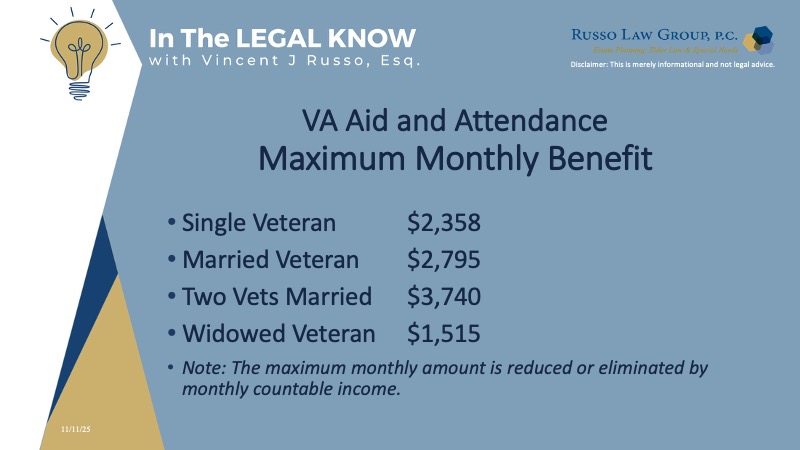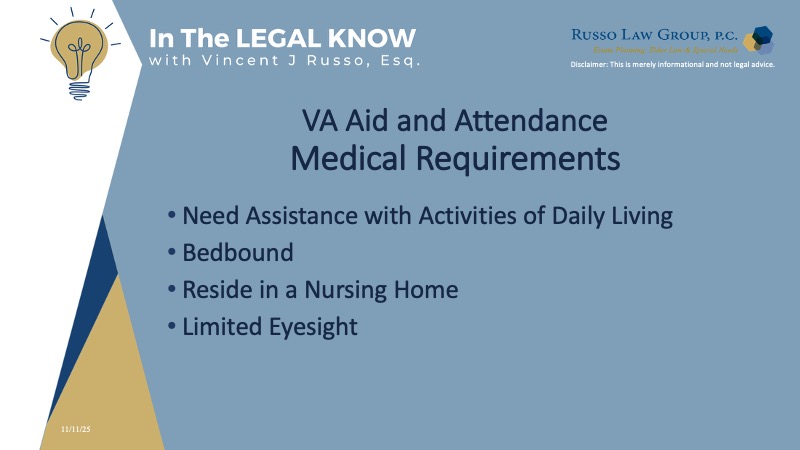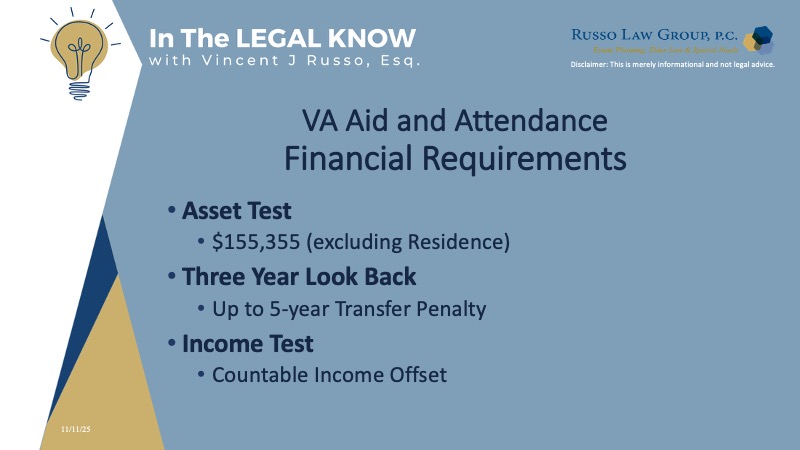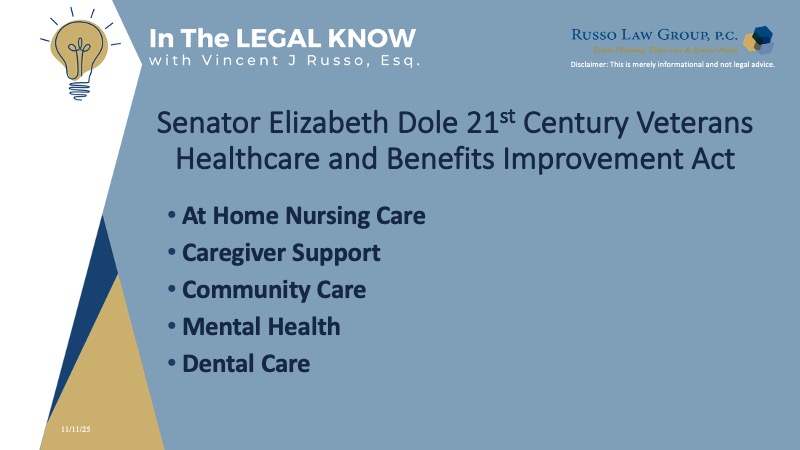In the big picture, since the tax world is constantly changing, this tax season is no different, with a myriad of rules, deductions, credits, and responsibilities that may seem overwhelming.
There is a program that is a hidden benefit for veterans in which they can qualify. They can receive a monthly stipend to help them with their long-term care needs. It is the “Aid and Attendance Program”.
This originally aired on the Catholic Faith Network’s show CFN Live: https://youtu.be/7-WAWqkrqU8
What is the hidden benefit for Veterans and surviving spouses?
The Aid and Attendance (A&A) program provides a benefit paid by the Department of Veterans Affairs (VA) to eligible veterans and their surviving spouses. This benefit helps with in-home care, assisted living, or nursing homes. Additionally, A&A is paid in addition to a veteran’s monthly pension or compensation.
Veterans: What Does the Benefit Mean to You?
- With the benefit in hand, you are able to afford the care you need.
- You never have to pay it back and it is completely tax free.
- Like Social Security, this pension is dependable and is paid directly to you by the Department of the Treasury.
- This benefit can be used for in-home care, board and care, assisted living communities, and private-pay nursing home care.

The monthly benefit is tax free. The maximum monthly amount may be reduced or eliminated by monthly household income.
Is there a Medical Requirement to be eligible for VA Aid and Attendance?
First, you must be a veteran. A veteran is a person who served as a member of the Army, Navy, Air Force, Marine Corps, or Coast Guard, or as a commissioned officer of the Public Health Service, the Environmental Science Services Administration or the National Oceanic and Atmospheric Administration.
Wartime military service is a requirement for pension benefits. The veteran’s service must have been full time service, and the veteran’s discharge must have been “other than dishonorable.”
The Veteran must also meet certain medical requirements to qualify for aid and attendance.
You may be eligible for this benefit if you meet at least one of these requirements:
- You need another person to help you perform daily activities, like bathing, feeding, and dressing, or
- You have to stay in bed—or spend a large portion of the day in bed—because of illness, or
- You are a resident in a nursing home due to the loss of mental or physical abilities related to a disability, or
- Your eyesight is limited (even with glasses or contact lenses you have only 5/200 or less in both eyes; or concentric contraction of the visual field to 5 degrees or less)
Are there financial eligibility rules to qualify for Aid and Attendance?
Yes, there are financial eligibility rules; and it can be quite complicated.
The Veteran (and spouse) cannot have a net worth (assets and income less unreimbursed Medicaid expenses) in excess of $155,355, excluding the homestead to qualify for benefit. Additionally, the V.A. will consider the liquidity and availability of the assets in order to determine eligibility for this benefit.
The VA also implemented a three-year lookback period to see if assets were sold below market value or gifted in a way that reduced net worth below the upper eligibility limit.
Transfer subject to penalty can delay the start of VA pension benefit payments for up to five years.
There’s also an upper limit on monthly countable income minus certain expenses such as unreimbursed medical bills, prescription out-of-pocket costs and Medicare and private health insurance premiums.
The most valuable non-reimbursed medical expenses are those that recur on a regular basis. For veterans rated for aid and attendance allowance, assisted living expenses, home care expenses, and nursing home expenses are all recurring medical costs.
The VA pays a benefit amount that makes up the difference between recipients’ countable income and the monthly upper limit.
What steps can a veteran take to plan for this benefit?
If a veteran wants to plan for eligibility, the veteran can set up a Veteran Asset Protection Trust. This trust can be funded with liquid assets and the veteran’s home. After three years from funding, the assets in the trust will not be counted for eligibility purposes.
Is my surviving spouse eligible for Aid and Attendance?
Yes, a widowed spouse of a veteran who needs long-term care may qualify for VA Aid and Attendance.
To qualify, the surviving spouse must meet the following requirements:
- Marriage: Be married to the veteran at the time of their death and for at least one year
- Single: Be single while applying
- Need: Need help with daily tasks like dressing and bathing, or need to stay in bed due to illness
- Requirements: Meet the medical and financial requirements
- Remarriage: If remarried after January 1, 1971 and before November 11, 1990, remarriage does not affect eligibility
The maximum monthly benefit for a surviving spouse is $1,515. The benefit can be used to pay for home care, adult day care, board and care, assisted living, and skilled nursing home care.
What is the Senator Elizabeth Dole 21st Century Veterans Healthcare and Benefits Improvement Act?
The Senator Elizabeth Dole 21st Century Veterans Healthcare and Benefits Improvement Act (The “Elizabeth Dole Veterans Benefits”) is a law signed in January 2025 that expands and improves various Department of Veterans Affairs (VA) benefits.
Key provisions include expanding at-home nursing care for eligible veterans, increasing support for family caregivers, providing more assistance for homeless veterans, and improving access to VA healthcare, education, and mental health services.
As to Healthcare and caregiving:
- At-home nursing care: Increases expenditure cap for non-institutional care alternatives, allowing eligible veterans with a nursing home-level need to be cared for at home.
- Caregiver support: Expands eligibility for the caregiver program to veterans with conditions predating 1975 and includes grants for family caregiver mental health services.
- Community care: Modifies the Community Care Program to improve access, including a provision for the VA to reach out to veterans about their options and provide protections for care agreements.
- Mental health: Boosts funding for mental health services, including the Veterans Crisis Line and suicide prevention programs.
- Dental care: Includes provisions to improve access to dental care for veterans.
What is the Wounded Warrior Project®?
The Wounded Warrior Project® (WWP) assists the most severely wounded veterans (those men and women who served our nation post 9/11) – and their caregivers – through its Independence Program. The veteran’s injury or illness does not have to be combat-related or to have occurred while in service. Furthermore, these warriors live with conditions like traumatic brain injury (TBI) and spinal cord injuries. They also live with multiple sclerosis, stroke, epilepsy dementia, Parkinson’s disease and brain tumors.
The goal of WWP’s Independence Program is to find new avenues for independence for both the warrior and caregiver. By working with warriors, families, caregivers, and WWP-provided support, the Independence Program helps craft support plans and goals that fit the individual objectives of injured veterans.
WWP’s Independence Program services are customized depending on the severity of the veteran’s medical condition. The goal is to augment the care already available and provide additional support for caregivers.
WWP provides experts to help warriors and families plan together for the future by creating a life care plan. Moreover, the plan includes a benefits assessment, a legal plan, and a financial plan. Warriors and caregivers are invited to participate in these planning services.
Russo Law Group was privileged to be involved with connecting over 300 Warriors with qualified legal services throughout the country over several years.
The Independence Program currently provides services in 49 states, Washington, DC, and Puerto Rico. Ninety-five percent of warriors receiving assistance through Independence Program live at home.
If you would like more information on the Independence Program, you can contact www.woundedwarriorproject.org.
What resources are available for Veterans and their families?
Here are a few key resources:
- VA Regional Office
- Accredited Attorney or Agent
- Service Organization
- Elder Law Attorney
- VA Benefits Hotline at 1-800-827-1000
Because the rules can be complex and may change, it is recommended to consult with a VA-accredited attorney or claims agent for personalized advice.
CLICK HERE to download our complimentary guide on veteran benefits!
If you would like to speak with an experienced elder law attorney regarding your situation or have questions about something you have read, please do not hesitate to contact our office at 1 (800) 680-1717. We look forward to the opportunity to work with you.
Disclaimer: The information provided above is for general informational purposes only and is not legal advice.








Comments (0)